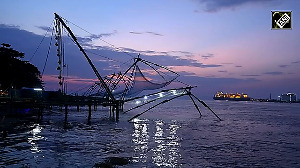'We've got a huge track record and success in bringing several biosimilars to the market.'

Biocon Biologics bought Viatris' global biosimilars business last year to become one of the top five global players in the space.
The Biocon subsidiary's managing director and chief executive officer Shreehas Tambe talks about the company's trajectory in the biosimilar market and key growth drivers in a video interview with Anjali Singh/Business Standard.
Biocon Biologics nearly doubled its revenue in the second quarter riding on integration of Viatris' biosimilar business and the growth in market share in US and Europe. So are you winning new customers in these markets?
Yes, and one of the big things that's helped us grow this product is we've been able to onboard new customers.
A new large payer that covers almost 100 million lives in the US has been brought on board for both Ogivri and Fulphila, which are our two key biosimilars (biological medicine highly similar to another already approved biological medicine) that will kick in 2024, so that will be a huge growth driver for us going forward.
We've seen that one of the largest Medicaid-managed care organisations in the US have boarded our unbranded biosimilar adalimumab in their national preferred formulary.
That covers over seven million lives.
We have also seen adalimumab being listed in (pharmacy benefit management company) CVS Caremark as a formulary option.
So, some of these new businesses and new customers who come onboard will not just drive business in this fiscal, but also in the coming fiscal.
Tell us about the demand for insulins in the emerging market. And are there any chances of a price cut to make them more affordable and accessible?
We supply recombinant human insulin and glargine (synthetic version of human insulin) to over 60 countries in emerging markets already.
And with the Viatris acquisition, to even more countries.
Many of our competitors are unable to continue supplies to these markets; many emerging markets are looking to get these products supplied by companies like ours, which are very high-quality biosimilar suppliers.
And we have gained market share in certain countries like Malaysia, where we have over 65 per cent, and in Mexico we have close to 90 per cent.
On whether there will be price cuts, I've always said that pricing is always an outcome of competition and not really control.
We've always been frugal in our approach, and we see ourselves as being profitable, even as pricing pressures continue in the days ahead, or whatever comes our way.
What are your thoughts on the future of the biosimilars market, and how is Biocon Biologics positioning itself to succeed in this market?
The opportunity ahead of us is massive because over the next 10 odd years until 2032, we see 55 blockbuster molecules and biologics going out or losing exclusivity.
From a peak sales perspective, it would be worth over $200 billion.
This is favourable to any company which is fully integrated.
And that's why it places Biocon Biologics in a unique position where we have capabilities in research and development, where we are developing our own portfolio.
And we've got a huge track record and success in bringing several biosimilars to the market.
We've got our own manufacturing capabilities, which have allowed us to scale these products in a very short period of time.
And most importantly, now we've acquired commercial capabilities so that we can realise the full value of the products in the business that we're doing.
So that is really what is needed to succeed.
And with this acquisition, it places Biocon Biologics in a very different league, positioning us in the top five, and we are looking to be among top three biosimilar players in the world.
By when do you plan to integrate the Viatris biosimilars business in Europe, Japan, Australia, and New Zealand?
When we completed the transaction with Viatris in November last year, we had a two-year transition services agreement because Biocon Biologics had no presence in any of the markets that we had acquired.
But today, nine months since we've acquired Viatris, we've been in control of over 50 per cent of the business.
And we've been able to scale up our capabilities to be in charge of that.
What is now left is to look at that remaining 50-odd per cent or less in terms of value.
And Europe forms a significant portion of that.
So we are looking to complete Europe as our next phase of transition, which will be a very complex one, given that it has 31 different countries, 19 different languages, and we're in the process of completing that by the end of the quarter and completing the entire transition from Viatris to us by the end of the fiscal, which would be clearly significantly ahead of the original two-year transition services agreement that we had signed.
Which markets and therapeutic areas do you see as the biggest growth drivers for the company?
If you break this up as three regions broadly, which is North America -- the region that we've already transitioned to today -- Europe, and then the third as the rest of the world, we see each one of them having significant potential.
Each one could record significant growth over their current levels.
And we are focused on growing them individually.
So, it's not any one particular region alone which we would have dependence or focus on.
And that's why we've acquired a global business and are looking to grow them independent of each other.
Feature Presentation: Aslam Hunani/Rediff.com












 © 2025
© 2025